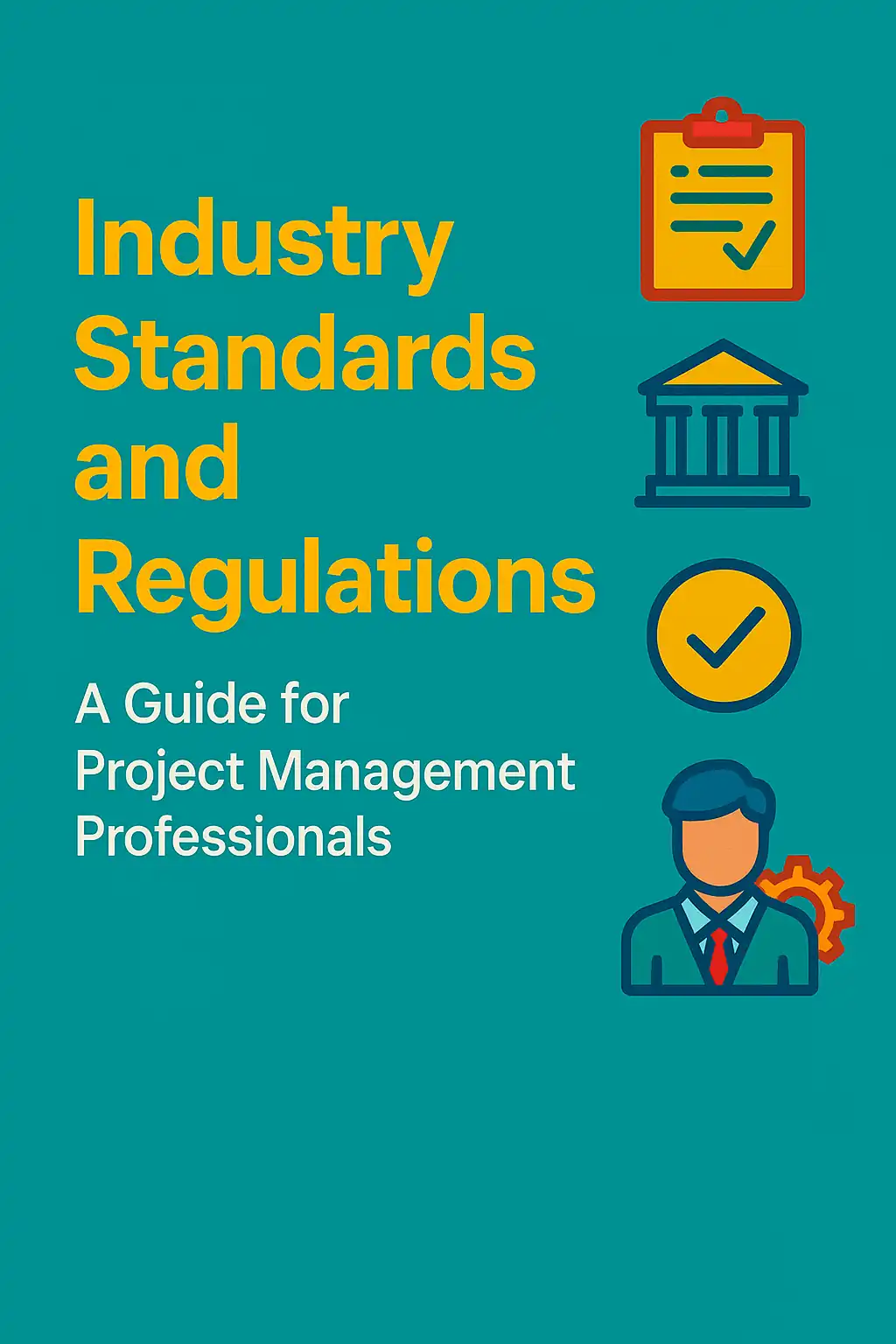Introduction to Project Management Careers
Project management is a critical discipline that involves the planning, execution, and oversight of projects across various industries, including construction, marketing, information technology, and more. It is defined as the application of knowledge, skills, tools, and techniques to project activities to meet project requirements and achieve specific goals. The importance of project management lies in its ability to ensure that projects are completed on time, within budget, and to the desired quality standards, ultimately aligning with the business’s objectives [13].
Industry standards and regulations play a pivotal role in shaping practices and methodologies. These standards provide a framework for project managers to follow, ensuring consistency, quality, and compliance across projects. They encompass a wide range of guidelines, including those related to safety, quality assurance, risk management, and environmental considerations. By adhering to these standards, project managers can mitigate risks, enhance project outcomes, and foster trust among stakeholders [5][8].
Compliance with industry standards not only safeguards the integrity of projects but also significantly influences career advancement and opportunities for project managers. Professionals who demonstrate a strong understanding of relevant regulations and standards are often viewed as more competent and reliable, making them more attractive candidates for leadership roles. Furthermore, organizations increasingly prioritize compliance in their project management processes, which can lead to enhanced job security and potential for growth within the field [11][12].
Understanding Industry Standards in Project Management
Industry standards play a pivotal role in guiding professionals toward successful project execution. These standards are established benchmarks that define best practices, processes, and methodologies, ensuring that projects are managed effectively and efficiently. Here’s a closer look at what industry standards entail and their significance in project management.
Definition of Industry Standards
Industry standards in project management refer to the documented agreements containing technical specifications or criteria that are established by recognized organizations. These standards serve as a framework for project managers to follow, ensuring consistency, quality, and compliance across various projects. They help in aligning project objectives with organizational goals and provide a structured approach to managing projects, which is crucial for achieving desired outcomes [6][12].
Key Organizations Defining Standards
Several key organizations are instrumental in defining and promoting industry standards in project management:
- Project Management Institute (PMI): PMI is a leading global association for project management professionals. It develops standards such as the PMBOK (Project Management Body of Knowledge), which outlines fundamental project management practices and processes.
- International Organization for Standardization (ISO): ISO develops international standards that cover various aspects of project management, including ISO 21500, which provides guidance on project management concepts and processes.
- International Project Management Association (IPMA): IPMA focuses on competence in project management and offers a range of standards and certifications that emphasize the importance of skills and knowledge in managing projects effectively.
These organizations not only create standards but also provide resources, training, and certification programs to help project managers enhance their skills and adhere to best practices [1][4].
Examples of Common Standards
Several widely recognized standards are essential for project management professionals:
- PMBOK (Project Management Body of Knowledge): Developed by PMI, PMBOK is a comprehensive guide that outlines the standard practices and processes in project management. It serves as a foundational resource for project managers, detailing knowledge areas and process groups essential for effective project execution [6][12].
- PRINCE2 (Projects IN Controlled Environments): This structured project management method emphasizes organization and control throughout the project lifecycle. PRINCE2 provides a clear framework for managing projects, focusing on delivering projects on time, within budget, and to the required quality standards [12].
The Importance of Compliance in Project Management
Compliance with industry standards and regulations is not merely a bureaucratic necessity; it is a cornerstone of project success and professional integrity. Understanding the implications of compliance—or the lack thereof—can significantly influence both project outcomes and a project manager’s career trajectory.
Implications of Non-Compliance on Project Success and Career Reputation
Non-compliance can have severe repercussions for projects, including delays, increased costs, and even project failure. When projects do not adhere to legal, regulatory, or internal standards, they risk facing penalties, legal actions, and reputational damage. This can lead to:
- Financial Losses: Projects that fail to comply may incur fines or additional costs to rectify compliance issues, which can strain budgets and resources.
- Reputational Damage: A project manager’s reputation is closely tied to their ability to deliver compliant projects. Non-compliance can tarnish a manager’s credibility, making it difficult to secure future projects or promotions within their organization [8].
- Career Advancement: Project managers who consistently deliver compliant projects are more likely to be recognized as leaders in their field, enhancing their career prospects and opportunities for advancement [14].
Risk Management and How Compliance Helps Mitigate Risks
Compliance plays a crucial role in risk management. By adhering to established standards and regulations, project managers can identify potential risks early in the project lifecycle and implement strategies to mitigate them. Key benefits include:
- Proactive Risk Identification: Compliance frameworks often include guidelines for risk assessment, enabling project managers to foresee and address issues before they escalate [3].
- Enhanced Decision-Making: Understanding compliance requirements allows project managers to make informed decisions that align with both project goals and regulatory expectations, reducing the likelihood of costly mistakes [2].
- Improved Stakeholder Confidence: Demonstrating compliance can enhance trust among stakeholders, including clients, team members, and regulatory bodies, fostering a collaborative project environment [8].
Case Studies of Compliance Failures and Lessons Learned
Examining real-world examples of compliance failures can provide valuable insights for project managers. Notable cases include:
- The Boeing 737 MAX Crisis: This incident highlighted the catastrophic consequences of non-compliance with safety regulations. The failure to adhere to regulatory standards not only led to tragic accidents but also resulted in significant financial losses and reputational damage for Boeing. The lessons learned emphasize the importance of rigorous compliance checks and the need for a culture of accountability within project teams [9].
- Volkswagen Emissions Scandal: Volkswagen’s decision to circumvent emissions regulations resulted in legal repercussions and a loss of consumer trust. This case underscores the critical need for ethical compliance and the long-term impact of non-compliance on brand reputation and market position [9].
Navigating Regulatory Frameworks
Understanding and adhering to industry standards and regulations is crucial for ensuring project success and compliance. This section provides practical guidance for project managers on how to navigate various regulatory frameworks effectively.
Overview of Common Regulatory Frameworks
Project managers often encounter a variety of regulatory frameworks that can impact their projects. Some of the most relevant include:
- General Data Protection Regulation (GDPR): This regulation governs data protection and privacy in the European Union and the European Economic Area. Project managers must ensure that any project involving personal data complies with GDPR requirements, including data processing, consent, and user rights.
- Occupational Safety and Health Administration (OSHA): OSHA regulations are vital for projects that involve workplace safety. Project managers need to integrate safety standards into project planning and execution to protect workers and comply with legal requirements.
- Project Management Institute (PMI) Standards: PMI provides a set of standards and guidelines that project managers can follow to ensure best practices in project management. Familiarity with PMI standards can enhance project quality and stakeholder satisfaction.
Strategies for Staying Informed About Evolving Regulations
Regulatory landscapes are constantly changing, and project managers must stay informed to ensure compliance. Here are some strategies:
- Continuous Education: Engage in ongoing professional development through workshops, webinars, and courses focused on regulatory changes relevant to your industry. This will help you stay updated on the latest compliance requirements.
- Networking: Join professional associations and forums where project managers discuss regulatory challenges and solutions. Networking with peers can provide insights into how others are navigating compliance issues.
- Subscribe to Industry Publications: Regularly read industry-specific publications and newsletters that cover regulatory updates. This will help you stay informed about changes that may affect your projects.
Tips for Integrating Compliance into Project Planning and Execution
Integrating compliance into project management processes is essential for minimizing risks and ensuring project success. Here are some practical tips:
- Incorporate Compliance in Project Scope: Clearly define compliance requirements in the project scope. This ensures that all team members understand the importance of adhering to regulations from the outset.
- Develop a Compliance Checklist: Create a checklist of regulatory requirements relevant to your project. Use this checklist throughout the project lifecycle to ensure that all compliance aspects are addressed.
- Regular Compliance Audits: Conduct regular audits during the project to assess compliance with relevant regulations. This proactive approach allows for early identification of potential issues and corrective actions.
- Engage Compliance Experts: If necessary, consult with legal or compliance experts to ensure that your project meets all regulatory requirements. Their expertise can provide valuable insights and help mitigate risks.
By understanding the regulatory frameworks that impact their projects and implementing strategies to stay informed and compliant, project managers can navigate the complexities of compliance effectively. This not only enhances project success but also builds trust with stakeholders and ensures the long-term sustainability of their projects.
Best Practices for Maintaining Compliance
Ensuring compliance with industry standards and regulations is essential for the success and integrity of any project. Here are some actionable best practices that project managers can implement to maintain compliance effectively:
- Creating a Compliance Checklist for Projects: Developing a comprehensive compliance checklist tailored to the specific requirements of each project is a fundamental step. This checklist should encompass all relevant laws, regulations, and internal policies that apply to the project. By systematically addressing each item, project managers can ensure that no critical compliance aspect is overlooked, thereby minimizing risks associated with non-compliance [11][15].
- Training and Educating Team Members on Compliance Requirements: It is crucial to foster a culture of compliance within the project team. This can be achieved by providing regular training sessions and educational resources that inform team members about the compliance requirements relevant to their roles. By enhancing their understanding of these regulations, team members will be better equipped to adhere to standards and contribute to the project’s overall compliance efforts [8][10].
- Regular Audits and Reviews to Ensure Adherence to Standards: Conducting periodic audits and reviews is vital for assessing compliance throughout the project lifecycle. These evaluations should focus on identifying any deviations from established standards and regulations. By implementing a structured review process, project managers can proactively address compliance issues before they escalate, ensuring that the project remains aligned with both legal and organizational requirements [9][12][14].
By integrating these best practices into their project management processes, professionals can navigate the complexities of compliance more effectively, ultimately leading to successful project outcomes while upholding ethical standards and stakeholder expectations [3][13].
Building a Career Around Compliance and Standards
Understanding compliance and industry standards is not just an added advantage; it is increasingly becoming a core requirement for professionals aiming to excel in their careers. This section explores various career paths, the significance of relevant certifications, and networking opportunities that can enhance a project manager’s career trajectory.
Career Paths Focused on Compliance
- Compliance Officer: Compliance officers play a crucial role in ensuring that organizations adhere to regulatory requirements and internal policies. They are responsible for developing compliance programs, conducting audits, and providing training to staff on compliance issues. This role is vital in industries such as finance, healthcare, and manufacturing, where regulatory oversight is stringent.
- Risk Manager: Risk managers assess and mitigate risks that could impact an organization’s ability to achieve its objectives. They analyze potential compliance risks and develop strategies to minimize them. This position is essential in sectors like construction, IT, and pharmaceuticals, where project managers must navigate complex regulatory environments.
- Quality Assurance Manager: Quality assurance managers ensure that projects meet certain standards and regulations. They develop quality control processes and conduct inspections to ensure compliance with industry standards. This role is particularly important in manufacturing and service industries where product quality is paramount.
The Value of Certifications Related to Compliance
Certifications can significantly enhance a project manager’s credentials and demonstrate their commitment to compliance and standards. Some notable certifications include:
- Project Management Professional (PMP): Offered by the Project Management Institute (PMI), the PMP certification is recognized globally and signifies that a project manager has the experience, education, and competency to lead and direct projects. Understanding compliance is a key component of the PMP framework, making it a valuable asset for project managers.
- Certified Compliance and Ethics Professional (CCEP): This certification focuses specifically on compliance and ethics, equipping professionals with the knowledge to develop and manage compliance programs effectively. It is particularly beneficial for those looking to specialize in compliance roles within organizations.
- ISO Certifications: Various ISO certifications, such as ISO 9001 for quality management systems, can also enhance a project manager’s qualifications. These certifications demonstrate a commitment to maintaining high standards and compliance with international regulations.
Networking Opportunities and Professional Organizations
Engaging with professional organizations and networking opportunities can provide project managers with valuable resources and connections in the field of compliance:
- Project Management Institute (PMI): PMI offers a wealth of resources, including networking events, webinars, and local chapters where project managers can connect with peers and industry experts. Participating in PMI events can help professionals stay updated on compliance trends and best practices.
- Compliance Certification Board (CCB): The CCB provides resources and networking opportunities for compliance professionals. Joining this organization can help project managers build relationships with others in the compliance field and gain insights into industry standards.
- Industry Conferences and Workshops: Attending conferences focused on project management and compliance can provide opportunities to learn from experts, share experiences, and network with other professionals. These events often feature sessions on the latest compliance regulations and best practices.
Conclusion
Adherence to industry standards and regulations is not merely a formality; it is a cornerstone of successful project execution and career advancement. Understanding and implementing these standards can significantly enhance a project manager’s ability to deliver projects on time, within budget, and to the satisfaction of stakeholders. Compliance ensures that projects align with legal requirements and industry best practices, thereby minimizing risks and fostering a culture of accountability and quality assurance.
As the landscape of project management continues to evolve, it is crucial for professionals to engage in continuous education. Staying informed about the latest developments in industry standards and regulations not only enhances a project manager’s skill set but also positions them as valuable assets within their organizations. This proactive approach to learning can lead to improved project outcomes and career growth, as project managers who are well-versed in compliance are often seen as leaders in their field.
In conclusion, the relationship between compliance and successful project outcomes cannot be overstated. By prioritizing adherence to industry standards, project managers can navigate the complexities of their roles more effectively, ensuring that their projects not only meet regulatory requirements but also achieve strategic objectives. Embracing this commitment to compliance will ultimately pave the way for a more successful and fulfilling career in project management.
Find out more about Shaun Stoltz https://www.shaunstoltz.com/about/.
This post was written by an AI and reviewed/edited by a human.



